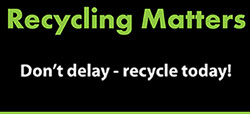What goes in which bin?
This page gives you information on what items you can put in your recycling bin and box and what should go in your rubbish bin and garden waste bin.
It's really important that you follow these guidelines as it helps to reduce contamination and means we can recycle, reuse or compost more of your waste. If you put wrong items in the wrong bin, this could result in the whole bin lorry load being classed as 'contaminated' and rejected for recycling.
The majority of residents place their general rubbish into black bin bags to keep their bins clean and odour free. This helps our crews who are being exposed to unbagged waste such as pet waste, food waste and nappy waste.
Unfortunately many residents are also placing recycling in black bags into their recycling bin. Black bags and carrier bags can't be recycled in the same way as plastic tubs and pots and therefore contaminate your bin. Any food waste, pet waste and dirty nappies, for example, placed in the recycling bin adversely effects the quality of the material often resulting in large volumes being unable to be recycled.
We have placed stickers on all household waste rubbish and recycling bins across the county as a reminder of what goes where.
Transcript video Your guide to recycling in County Durham (PDF, 105 KB)
Recycling
Our recycling wagons have separate, split compartments. Your recycling bin is emptied into one side and the glass box is emptied into the other. Glass and recycling are sorted differently at the recycling plant and this means more of your waste can be recycled and turned into new products.
For every item we recycle, we are reducing the need to use raw materials, which helps save energy and precious resources. It only takes a quarter of the energy to make a plastic bottle from recycled plastic as from new materials. Metal and glass packaging can be recycled endlessly, without loss of quality. Imagine how much energy you could save!
What goes in my recycling bin
Do not place masks, lateral flow device tests, gloves or aprons in your recycling bin. If anyone in your household has symptoms or has tested positive for Covid-19, your items should be double bagged and placed in your rubbish bin.
Do not put your recycling into black sacks or plastic bags - put the items loose into the bin. If you have extra recycling and it won't fit in your bin, put it into a clear/see-through plastic bag and leave it next to your recycling bin.
When recycling, please remember:
- wash and squash items - this saves space, keeps your bin clean and stops contamination
- cardboard boxes can go in your recycling bin - large ones can be flattened and placed next to your recycling bin or you can take them to the household waste recycling centres, please make sure cardboard is dry, we cannot recycle wet cardboard
- do not put clothes, shoes or bedding in your recycling bin - these should be taken to charity or your local recycling centre
The following items go into your grey recycling bin with the blue lid.
| Material | Yes please | No thanks |
|---|---|---|
Plastics |
|
|
Mixed paper and card |
|
|
Food tins and drink cans |
|
|
Cartons |
|
|
Aerosols |
|
Plastic recycling in County Durham
Find out more about plastic recycling in the county: Plastic Recycling in County Durham.
The milk bottle journey - video transcript (PDF, 109 KB)
Your guide to plastics recycling video transcript (PDF, 100 KB)
General plastics recycling in County Durham video transcript (PDF, 106 KB)
Plastic bottle recycling in County Durham video transcript (PDF, 103 KB)
What goes in my recycling box
The following items go into the recycling box.
| Material | Yes please | No thanks |
|---|---|---|
Glass bottles and jars |
|
|
If you regularly have lots of glass, it's best to request an extra green box for free and split the bottles and jars between them both. Lighter boxes are better for our crews to pick up and empty - you can ask for another box on our Ask for a new bin page.
Soft Plastics
Soft plastics are lightweight plastics that cannot be placed in recycling bins at home. These include bread bags, salad bags, plastic crisp packets, pasta bags and chocolate or biscuit wrappers. You can now recycle your soft plastics a large number of supermarkets and stores across County Durham. Please check with your local supermarket or store before recycling.
Other recyclable items
Find a full list of A-Z household waste items in our Recycling A- Z (PDF, 160 KB).
Rubbish
What goes in my rubbish bin
If in doubt, keep it out of your recycling bin - if you're unsure whether you can recycle an item, leave it out of your recycling bin and put it in your rubbish bin. The following items go in your rubbish bin.
| Material | Yes please | No thanks |
|---|---|---|
Household waste |
|
|
Ecigarettes and vapes
We have over 70 vape recycling points across Durham. You can recycle undamaged ecigarettes and vaping devices at one of the following Waste electrical and electronic equipment (weee) recycling points - simply place your ecigarettes or vapes in the tube provided.
All of our household waste recycling centres also accept vapes.
What goes in my garden waste bin
Please do not bag your garden waste - put it loose in the bin. The following items go into the garden waste bin.
| Material | Yes please | No thanks |
|---|---|---|
Garden waste |
|
|
Food and pet waste must not be added to your garden waste to prevent the spread of bacteria and we cannot accept any type of fruit from fruit trees, either loose or attached to branches. Any form of food waste is not accepted in garden waste bins due to the risk of spreading of plant, animal or human disease with in the finished compost.
Soil attached to roots is not a problem, but large amounts of soil make the bin extremely heavy and difficult to empty. You can take any surplus soil to one of the household waste recycling centres.
Plastic and pottery cannot be composted. Please reuse where possible or dispose of these in your rubbish bin or at a household waste recycling centre.
Diseased plants/leaves - advice from the Forestry Commission
If leaves are from a tree free from infection they can continue to be composted and disposed of using our garden waste scheme.
Leaves from infected trees or trees suspected of being infected should not be removed from the site, so do not put them in green waste bins for composting as this risks spreading the disease. Burning them on site is the best option.
Batteries
It is really important that you don't put batteries of any kind in any of your bins. They can cause fires in our refuse vehicles or at the waste sorting facilities. Most supermarkets have battery recycling areas or you can take them to one of our small electrical waste collection points.
Small electrical waste
Unused or broken electrical items, small enough to fit in a carrier bag, can be taken to one of our collection points across the county. Please don't put them in any of your bins. A full list of our collection points can be found here.
Kitchen Knives
All metal knives can be recycled at one of our Recycling centres (tips) where there will be a skip for scrap metal.
Nappy contamination
If you do choose to use disposable nappies, please ensure you place them in the correct bin. Nappies cannot be recycled and should be placed in your rubbish bin. We are supporting Keep Britain Tidy's nappy contamination campaign 2021 which aims to educate parents, grandparents, childminders and carers that disposable nappies should never be put in the recycling bin and to encourage them to dispose of nappies correctly. Please don't put any nappies in your recycling bin as this is contamination.
Finding out when your collection day is
Please enter your house number and postcode into My Durham. You can download a collection calendar which tells you when your bins will be emptied.
What happens if you put the wrong things in the wrong bin
You will find a yellow sticker on your bin and a letter through your door to help you to understand how to 'Bin it right'. You may also receive a home visit to explain recycling in more detail.
If you continue to place non recyclable items in your recycling bin you will receive an orange sticker and will have to remove said items and place your bin out on next collection day.
- Email help@durham.gov.uk
- Telephone 03000 26 0000
- Email wasteaware@durham.gov.uk
- Telephone 03000 26 1000



 Share this page on Facebook
Share this page on Facebook
 Share this page on Twitter
Share this page on Twitter
 Print this page
Print this page





